FIFA Club World Cup set to showcase revolutionary refereeing technology
Some of the initiatives aim to enhance the viewing experience for fans
The month-long FIFA Club World Cup promises to be a spectacle not just for the quality of the soccer on display — but also for the unprecedented levels of technology that will aid referees in real-time decision-making.
Set to kick off this Saturday, the 32-team tournament will showcase the world's top club teams, while also serving as a testing ground for a host of innovations aimed at bringing more transparency to the officiating process and creating greater fan engagement.
In a briefing with reporters on Wednesday, FIFA’s Referees Committee Chairman Pierluigi Collina laid out the suite of new tools and protocols that will be in place for the tournament that will be held in the United States.
“We can bring transparency and clarity to what the referee does on the field of play,” Collina said, outlining the core principle driving the integration of technology in officiating.
As the game continues to evolve, FIFA’s approach signals a willingness to embrace innovation without losing sight of the sport’s human elements. Referees, often the most scrutinized individuals during a game, will be equipped like never before with better tools to make accurate decisions.
Among the innovations that will be used by match officials at this expanded edition of the Club World Cup is an eye-level cam attached to the referee’s headset. Though not designed to directly impact decisions, the ref cam is instead intended to offer audiences a behind-the-scenes look from the referee’s vantage point.
“The objective is to offer the TV viewers a new experience,” Collina said, adding that the footage would not be shown live during gameplay — with the exception of the coin toss — but used to give fans “a very unique perspective.”
In fact, Collina said the rollout would include showing footage that’s “non-controversial” such as unique angles when it comes to a goal or save. Nonetheless, it seems like a missed opportunity to bring greater transparency to the game.
“It is a trial,” he said. “What will be the future? We will see.”
Ref cams have been in experimental use in England at the grassroots level primarily as a deterrent to abuse towards referees. At this point, however, their introduction on the global stage underscores FIFA’s increased interest in deepening fan engagement.
Not all the innovations will be for entertainment purposes. Also debuting at this year’s tournament will be public address announcements from match officials following key decisions, particularly those involving VAR reviews.
This system, already used in some international competitions, allows the tournament’s 35 referees to verbally explain decisions over the stadium’s loudspeaker, helping eliminate confusion and reinforcing trust in the decision-making process.
At the same time, offside calls, which have often been the subject of intense debate, will now be aided by automated detection systems that use artificial intelligence. It is the next step in the evolution since VAR was first used at the 2018 World Cup.
In addition to technological tools, FIFA is also introducing stricter enforcement of existing rules around time-wasting — a practice that has long frustrated players, coaches and fans.
Goalkeepers, who often delay play to disrupt momentum and kill time, will now be limited to holding the ball for a maximum of eight seconds, a rule that will be strictly enforced. Collina noted that goalkeepers frequently exceed this limit, often to as much as 25 seconds.
“There’s nothing entertaining in this,” he said.
To ensure compliance, referees will automatically award a corner kick to the opposing team if a goalkeeper violates the rule. Collina, however, expressed confidence that players will quickly adapt. Furthermore, referees will also count down from five seconds with their arm raised to indicate the seconds that remain.
“We are confident there won’t be many corner kicks awarded,” he added.
According to Collina, this rule was tested extensively in 160 matches across South America’s Copa Libertadores and Copa Sudamericana competitions. The results were promising.
“Only two infringements occurred,” Collina noted.
The emphasis, Collina stressed, is to make games more enjoyable. FIFA’s long-term vision is to remove unnecessary delays and interruptions, reinforcing the notion that soccer is, above all, a spectator-driven experience.
“We want to make the game more enjoyable and entertaining and there is nothing entertaining about the ball not rolling on the field of play,” he said.





